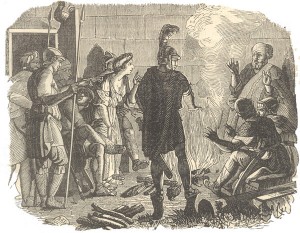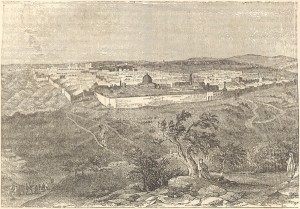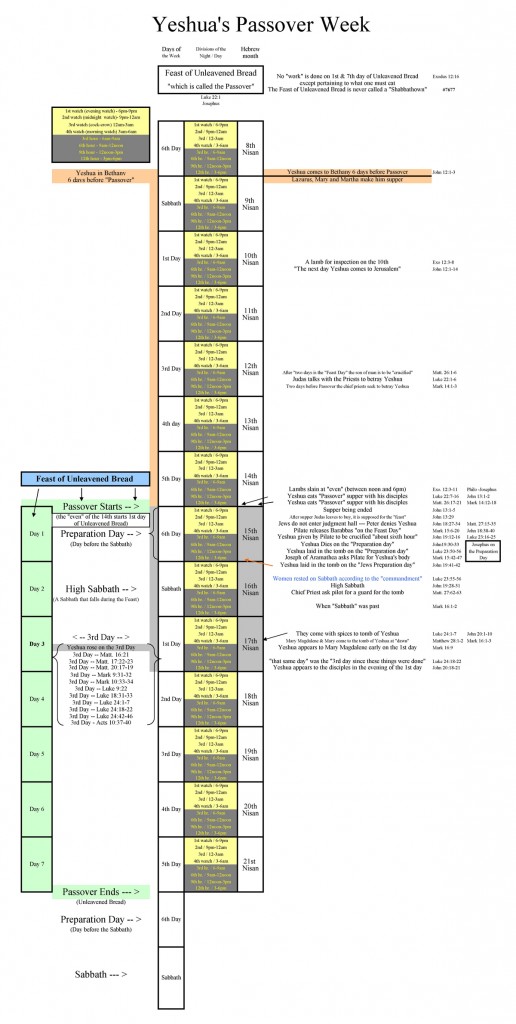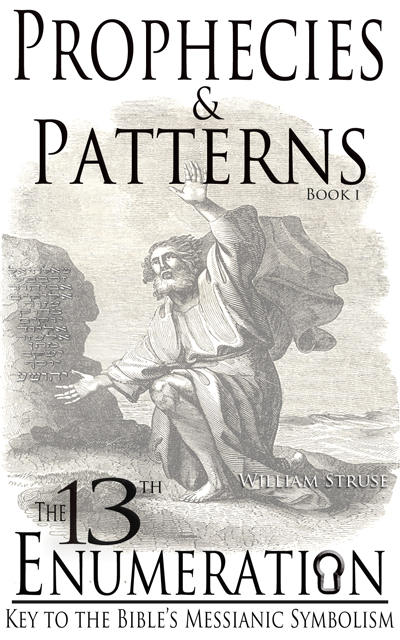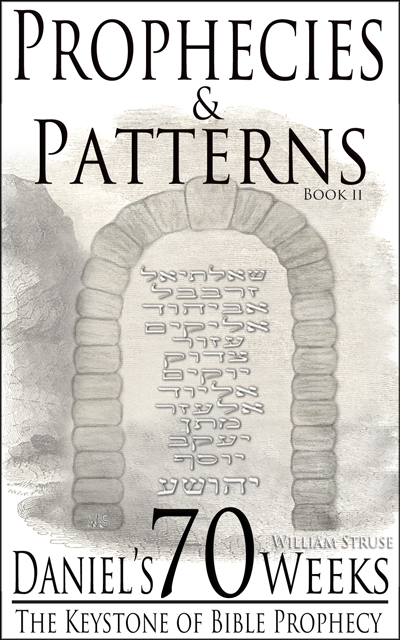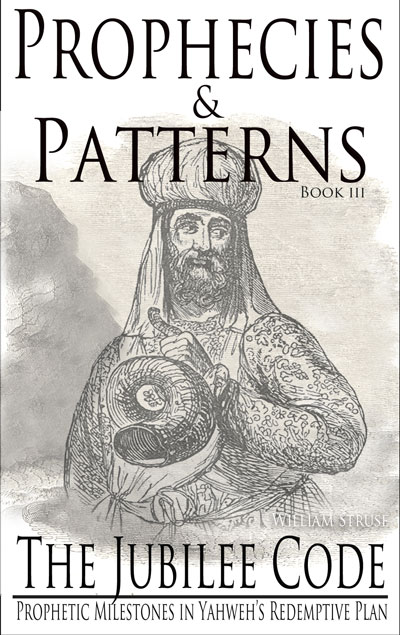Author’s Note: My recent article The 14th Sacrifice looked at the gospel accounts pertaining to Yeshua’s Passover supper. That article concluded that Yeshua was not crucified on the 14th of Nisan but instead the most plain reading of the New Testament record shows he was crucified on the feast day proper. (i.e. 15th Nisan, the 1st day of the Feast of Unleavened Bread) My next few articles will look at Yeshua’s Passover week chronology in light of some of the objections which are often raised by those who believe Yeshua was crucified on the 14th of Nisan.
The “Preparation” Day
My last article on chronology of Yeshua’s Passover week looked at why Yeshua’s accusers were not willing to enter Pilate’s judgment hall for fear of being “defiled”. (see: Defiled on the “Passover”) Shortly after these events Yeshua was taken and crucified. In the gospel accounts it tells us that this day was the “preparation” day. In this article I want to look at this day in relation to the events of Yeshua’s Passover week. Take a moment to read the following verses, they represent each usage of the term “preparation” in the New Testament.
Mark 15:42-43 42 And now when the even was come, because it was the preparation, that is, the day before the sabbath, 43 Joseph of Arimathaea, an honourable counsellor, which also waited for the kingdom of God, came, and went in boldly unto Pilate, and craved the body of Jesus.
Luke 23:52-54 2 This man went unto Pilate, and begged the body of Jesus. 53 And he took it down, and wrapped it in linen, and laid it in a sepulchre that was hewn in stone, wherein never man before was laid. 54 And that day was the preparation, and the sabbath drew on.
Matthew 27:59-62 59 And when Joseph had taken the body, he wrapped it in a clean linen cloth, 60 And laid it in his own new tomb, which he had hewn out in the rock: and he rolled a great stone to the door of the sepulchre, and departed. 61 And there was Mary Magdalene, and the other Mary, sitting over against the sepulchre. 62 Now the next day, that followed the day of the preparation, the chief priests and Pharisees came together unto Pilate
John 19:13-16 13 When Pilate therefore heard that saying, he brought Jesus forth, and sat down in the judgment seat in a place that is called the Pavement, but in the Hebrew, Gabbatha. 14 And it was the preparation of the passover, and about the sixth hour: and he saith unto the Jews, Behold your King! 15 But they cried out, Away with him, away with him, crucify him. Pilate saith unto them, Shall I crucify your King? The chief priests answered, We have no king but Caesar. 16 Then delivered he him therefore unto them to be crucified. And they took Jesus, and led him away.
John 19:31-42 31 The Jews therefore, because it was the preparation, that the bodies should not remain upon the cross on the sabbath day, (for that sabbath day was an high day,) besought Pilate that their legs might be broken, and that they might be taken away….. 42 There laid they Jesus therefore because of the Jews’ preparation day; for the sepulchre was nigh at hand.
The word “preparation” comes from the Greek paraskeue, it means a making ready, a preparation, or equipping. It is used almost exclusively in the Scripture to designate the day before the Sabbath. I say “almost exclusively” because some contented that John 19:14 uses the term “preparation” to refer to the day before the “Passover”.
Of the verses above, Mark 15:42, Luke 23:52 & John 19:31 each clearly state that the “preparation” day is the day before the Sabbath. Taken at face value these verses need no further clarification. Yeshua was crucified on the day before the Sabbath. So how do we reconcile John 19:13 where it states that the day Yeshua died was the “preparation of the Passover”?
In my opinion this is another place where the term Passover is used in the general sense to represent the feast of Unleavened Bread. As I showed in my articles The 14th Sacrifice and Defiled on the “Passover” the term “passover” is used in the Bible to represent the Passover supper proper as well as the entire Feast of Unleavened Bread. John 19:13 then is not saying that Yeshua was crucified on the day before the Passover supper but that he died on the “preparation” day during the Feast of Unleavened Bread. There are several ways to prove this:
1. The Feast of Unleavened Bread does not require a “preparation” day because work related to the preparation of food is not prohibited.
2. John 19:31 states the day following the “preparation” was a “high Sabbath”. A “high Sabbath” can only refer to a Sabbath day which has been elevated by its inclusion within the feast days. The Feast of Unleavened Bread is not a true “Sabbath” or “rest” and it is never referred to as such in the Bible.
3. The gospel accounts show that the day following this “high” Sabbath was the 1st day of the week.
Take a look at the verse below. In this passage Luke is describing the burial of Yeshua. He describes the day as the “preparation, and the sabbath drew on”. Verse 56 provides a unique confirmation that this day is indeed the “Sabbath” or 7th day of the week. Notice it states that the women returned from the sepulcher and then “rested the Sabbath day according to the commandment”. The feast of Unleavened Bread has no such commandment because Exodus 12:16 allows work related to the preparation of food.
With the above information in mind it can be reasonably concluded that Yeshua was crucified on the “preparation day” or the 6th day of the week which also happened to be the 1st day of the Feast of Unleavened Bread. That the following day was the weekly Sabbath and by its very position within the 7 day feast it was a special or “high” Sabbath.
“Preparation” = 3904, paraskeue {par-ask-yoo-ay’}
Meaning: 1) a making ready, preparation, equipping 2) that which is prepared, equipment 3) in the NT in a Jewish sense, the day of preparation 3a) the day on which the Jews made necessary preparation to celebrate a sabbath or a feast
Origin: as if from 3903; TDNT – 7:1,989;
Usage: AV – preparation 6; 6
The references below are a sampling of historical references to the “preparation day”.
Antiquities of the Jews 16:162-163 162 “Caesar Augustus, high priest and tribune of the people, ordains thus:–Since the nation of the Jews has been found grateful to the Roman people, not only at this time, but in time past also, and chiefly Hyrcanus the high priest, under my father, {a} Caesar the emperor, 163 it seemed good to me and my counsellors, according to the sentence and oath of the people of Rome, that the Jews have liberty to make use of their own customs, according to the law of their forefathers, as they made use of them under Hyrcanus the high priest of the Almighty God; and that their sacred money be not touched, but be sent to Jerusalem, and that it be committed to the care of the receivers at Jerusalem; and that they be not obliged to go before any judge on the Sabbath day, nor on the day of the preparation to it, after the ninth hour, {b}
Ignatius to the Trallians 9:2
Martyrdom of Polycarp 7:1
Didache 8:1
Authors Note: This chart shows the chronology described above. For those looking to search this out for yourself you will find Scriptural references provided for each event. I know this is a little different format than most are use to but it helped me organize the events in a way which allows me to take the New Testament events at face value in their most natural and plain reading.
Click on the Image to enlarge:
For more on Yeshua’s Passover Week chronology please see the following articles:
* The 14th Sacrifice
* “The Feast Day”: Judas’ Betrayal
* Defiled on the “Passover”
* The “Preparation” Day
* The “3rd Day”

